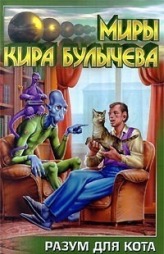“Jubilee-200” (short story) by Kir Bulychev
English Publication History: Red Star Tales (Russian Life Books, 2015)
Original: Russian (Юбилей-200), 1985
Translated by Yvonne Howell, 2015
Synopsis: Nearly two centuries prior, a chimp breeding program began with the ultimate purpose of producing a lineage with the traits of Logic and Reason. Limited success has been observed with the elderly chimp named Johnny as he’s able to hold a mundane conversation but is still prone to his wild nature. Meanwhile, through the eyes of the Leader and the rest of his herd, the scientists are dumb to their true intelligence and cunning, with which they hope to steal a plane and make an escape to Africa.
Pre-analysis: I’m having trouble tracking down the direct quote, so I’ll paraphrase: someone was said that monkeys don’t speak because they don’t want to be put to work. I believe this was a serious attempt at reasoning why apes don’t speak like humans, so it must have been a fairly early non-scientific approach to the theory (say, early or late nineteenth century). This theory would imply that apes have (1) a vocabulary and grammar as well as (2) the anatomical structures to form thoughts and produce speech. Whoever said the paraphrase above had one thing right, however: apes are capable of deception and lies, but not to the great extent as collectively fearing being put to work.
Analysis: A coup would be a sudden overtaking of authority while one definition of revolution omits authority in the sudden change of a situation. The chimps in “Jubilee-200” had no intention of throwing a coup as they simply wanted to escape from authority rather than replace it. Their secret revolution, therefore, was their well-planned escape through their decades of deception. If the scientists are seen as the government and the chimps as citizens, the story—written in 1985—takes on an ominous glow only six years before the intergovernmental coup d’etat.
Sometimes Big Brother knows; sometimes, too, Big Brother lets things go the way he wants because the means agree with the end, even though those means aren’t his own: protests could be a useful pressure valve for the population or some terror may spark much wanted changes in law enforcement. Though the perpetrators of the protests and terror may be getting their way, the authorities sometimes smile down at their actions and silently play into their hands. I won’t expound on any conspiracies (domestic or international). If a popular grassroots means meet the same end as the government’s intended forced means, surely it would allow the popular means to unfold… possibly with an unofficial blessing and/or a well-informed mole.
On August 18, 1991, Yeltsin led a coup against Gorbachev; both wanted freer economic systems, yet the former wanted reform faster than the latter. Perhaps Gorbachev had his hands tied for policy but wished for faster reform, which Yeltsin was able to accomplish through swifter means. Surely, Yeltsin hated Gorbachev, but if Yeltsin could pull off the coup in favor of greater reform, then perhaps Gorbachev would have applauded it? Gorbachev had the opportunity to send Yeltsin to a far-off ambassador errand when the firebrand openly criticized Gorbachev, but Gorbachev kept the man on, though through a demotion. Gorbachev says he regrets keeping Yeltsin, but…
Review: Another story ripe for analysis! Much as the chimps unfold their plan in secret to a greater end, the story, too, unfolds from a basic onset toward a greater end with a twist in the end (as analyzed in the analysis portion of this review). It’s well structured, well thought out, and unique – add in the twist and the fertile ground for analysis and you have yourself a satisfying story!



